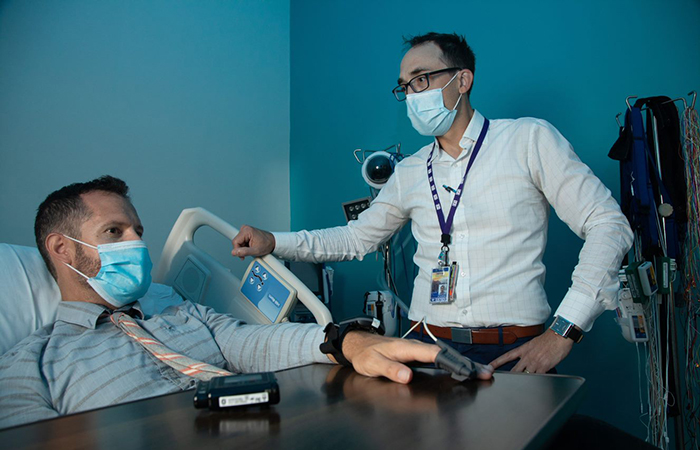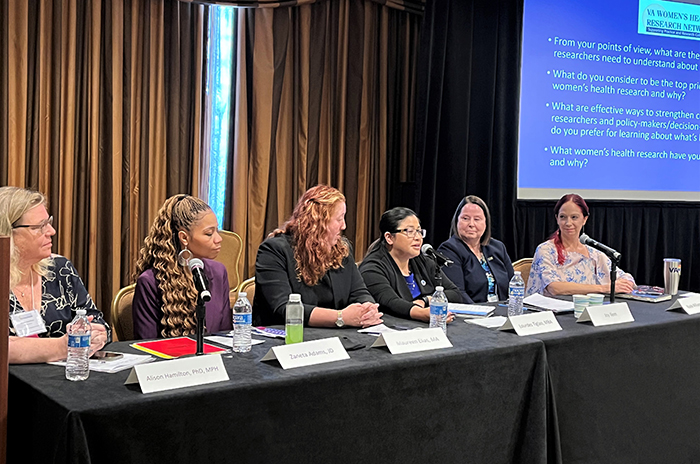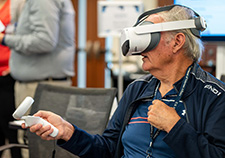Office of Research & Development |
 |


Dr. Peter Colvonen (right) studies sleep disorders, among other post-deployment health issues, at the VA San Diego Healthcare System. (Photo by Kevin Walsh)
October 20, 2020
By Tristan Horrom
VA Research Communications
The researchers found that 57% of Veterans in the study had insomnia disorder.
Post-9/11 Veterans have “alarmingly high rates” of insomnia disorder, according to a VA San Diego Healthcare System study. More than half of the Veterans studied had the disorder. Insomnia rates were even higher in Veterans with posttraumatic stress disorder (PTSD), traumatic brain injury (TBI), and chronic pain.
The results appeared in the June 12, 2020, issue of the journal Sleep.
Insomnia is defined as difficulty falling or staying asleep, waking up earlier than desired, or significant sleep-related problems during the daytime.

VA Researcher Named One of U.S.’ Top Female Scientists

2023 VA Women's Health Research Conference

Self-harm is underrecognized in Gulf War Veterans

Virtual reality technology helps Veterans in pain
Doctors have long known that Veterans often have sleep problems. Past research has suggested that Veterans may have double or even triple the rates of insomnia, compared with non-Veterans. This issue could stem from several aspects of military life, such as irregular sleep schedules during active duty and harsh living conditions. Physical and psychological injury and post-deployment trouble reintegrating into civilian life may also play a part.
While insomnia is a well-known problem for Veterans, accurate numbers of how many Veterans have the condition are hard to come by. One problem with collecting data on insomnia is that the terms used are inconsistent. Many patients may have insomnia symptoms or report sleep problems. But a clinical diagnosis of insomnia disorder requires a weekly sleep diary and in-depth clinical review.
To get a clearer picture of the issue, researchers collected data on more than 5,500 post-9/11 Veterans at a single VA health care system over a period of seven years. They evaluated each patient for insomnia disorder, along with other conditions and characteristics.
The researchers found that 57% of Veterans in the study had insomnia disorder. This rate was fairly consistent regardless of age, sex, race, and military branch. Interestingly, the number of military deployments and history of alcohol misuse did not affect the risk of insomnia. By way of comparison, studies of the general adult population, in the U.S. and other countries, show an insomnia prevalence of around 30%.
Insomnia disorder rates were even higher in Veterans with certain conditions. More than 93% of Veterans with PTSD had insomnia disorder. About 78% of Veterans with TBI had the disorder. And 70% of Veterans with chronic pain also had insomnia.
The results reveal a need to screen all Veterans for insomnia, says Dr. Peter Colvonen of the VA San Diego Healthcare System and University of California San Diego, lead researcher of the study. Previous studies of medical records found insomnia rates of only 3% in Veterans. The Sleep study shows that the numbers are actually much higher, and that insomnia disorder often goes unscreened and untreated in VA, say the researchers.
One reason for this, explain the researchers, could be that many clinicians do not see insomnia as a separate condition. Rather, they regard it as a symptom of something else—like PTSD or pain—and therefore do not screen for insomnia directly. Insomnia often is not listed as a separate diagnosis in a patient’s health record.
Pointing out the discrepancy between actual prevalence rates and what clinicians in VA are reporting, explains Colvonen, “can highlight the need to increase awareness of insomnia and insomnia treatment within the VA. Offering more and better evidence-based treatments ultimately increases the client-centered care of the VA.”
Insomnia can cause serious health problems. It has been linked to reduced quality of life, increased risk of death, and more health care utilization. Lack of sleep can cause problems with cognitive, emotional, social, and physical functioning. Insomnia can also predict mood disorders and suicidal behavior.
For these reasons, the study authors call for better screening and treatment of Veterans for insomnia. Research shows that cognitive behavioral therapy, a psychotherapy treatment, can significantly improve insomnia. Cognitive behavioral therapy is considered a front-line treatment for insomnia, and is preferred over medication to treat it, according to clinical practice guidelines. Increased access to cognitive behavioral therapy and behavioral sleep medicine are “essential” to prevent the many health problems that insomnia can cause, conclude the researchers.
According to Colvonen, VA is doing well rolling out cognitive behavioral therapy for insomnia, and training clinicians in the treatment.
VA Research Currents archives || Sign up for VA Research updates